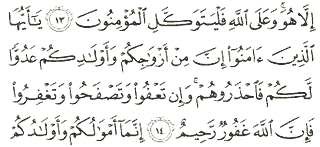Spouse and Children, Fasting for a year, Fathers
Issue 599 » September 17, 2010 - Shawwal 8, 1431
Living The Quran
Spouse and Children
Al-Taghabun (Loss and Gain) Chapter 64: Verse 14
 "O you who believe! Among your spouses and children there may be enemies for you, so beware of them. Yet, if you pardon, forbear, and forgive, then God is All-Forgiving, All-Compassionate."
"O you who believe! Among your spouses and children there may be enemies for you, so beware of them. Yet, if you pardon, forbear, and forgive, then God is All-Forgiving, All-Compassionate."
Love of family may sometimes bar a person from his or her religious duties or cause him or her to indulge the family excessively or to work for the children and their future without considering the children's duties towards God and their afterlife, whereas true love necessitates the parents should first consider the afterlife and the religious duties of their children. They should consider their worldly welfare within the framework of Religion.
This verse draws the attention of spouses to this fact and warns them. However, parents should be careful, patient, and tolerant in their mutual relations and in their approach to the conduct of their children. They should be forbearing and pardon their mutual faults towards each other and the faults of their children towards themselves. They should also overlook any faults concerning worldly matters and be able to act as educators concerning religious matters.
Compiled From:
"The Quran: Annotated Interpretation in Modern English" - Ali Unal, p. 1146
Understanding The Prophet's Life
Fasting for a year
Abu Ayyub al-Ansari (may Allah be pleased with him) narrated: Allah's Messenger (peace be upon him) said: "Whoever fasts in Ramadan, and six (days) of Shawwal, it will be (equivalent to) as if he/she fasted a whole year (in terms of rewards)."[Reported by Muslim, at-Tirmidhi, Abu Dawood, Ahmad, Ibn Majah]
In commenting on the above mentioned Hadith, As-Sananee said in Subul us-Salam: "If the thirty days of Ramadan fasting are assimilated with the six days of fasting in Shawwal, it altogether makes 36 days. According to Shariah (Islamic law), each virtue is rewarded ten times. Therefore, if we multiply 36 days with 10, it makes 360, a number which equals the days of a year of Islamic calendar. Some scholars are of the opinion that these six days of fasting in Shawwal must be completed in a continuous order right after the end of Ramadan. Some believe that it is enough to merely complete six days of fasting in Shawwal (in any order, either successive or with intervals), an opinion which is deemed to be correct."
Compiled From:
Islaam.com
Blindspot!
Fathers
Muslims naturally feel inclined to place the mother at the centre of the process of raising children, unwittingly ignoring the father’s role. Islamic tradition does stress the role of the mother. For example, when asked who a Muslim should love most, the Prophet Muhammad said, “Your mother, your mother, your mother and then your father.” It is also said that paradise lies at the feet of the mother. As a result, we tend to focus on the father as an individual, not as someone who should and can play a central role within his family.
We need to creatively tap into Islamic values for solutions because that is what Muslim families are most likely to be receptive to. The father is more than just an individual. He can play an important role, far beyond that of just the financial protector. The Prophet Muhammad himself was a role model as a father. When his own daughter would come to him, he would stand up out of respect for her, as people in traditional societies often do. We have forgotten these aspects of the Prophetic example. We are replacing these values with an obsession with enforcing rights and duties. That is what is destroying the spirit of the family.
Many fathers miss the opportunity to educate their children and accompany them through life. An absentee father spends long hours working or engaged in voluntary community service, at the expense of time with his family. Muslims keep saying the Islamic tradition cares for wholesome family life but Muslims themselves are having a difficult time upholding these values because we have lost our grasp of what it means to be a good Muslim and a good parent.
Muslim families need to share experiences with those who share the same problems. We need to be open and learn from different sources, including non-Muslim ones. We need to take the best from mainstream psychology and social studies and incorporate these into solutions custom-made to help Muslim families. We don’t necessarily have to integrate into society by abandoning our heritage but rather, integrate the positive things we learn from society into our lives.
Compiled From:
“Fatherhood in Islam” – Tariq Ramadan